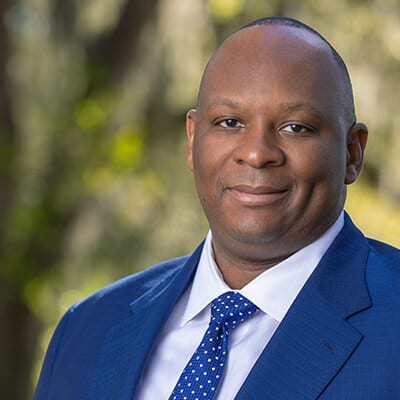New Orleans weather and scenic views are perfect for bicycle enthusiasts. Unfortunately, riders here face the same risks as in other well-populated cities. When a bicycle and motor vehicle collide, the injuries a cyclist suffers can be serious and even fatal. If you or a loved one suffered injuries in a bicycle accident, you may be entitled to compensation for your medical bills and other losses. Contact a New Orleans Bicycle Accident Lawyer at Wright Gray Law Firm to hear your legal options.
New Orleans Bicycle Accident Guide
- Why Choose Wright Gray Law Firm?
- New Orleans and Louisiana Bicycle Laws
- Louisiana’s Dooring Law
- Does Louisiana Require Bicycle Riders to Wear Helmets?
- Who May Be Responsible for Your Bike Accident Injuries?
- What if I was Partly Responsible for the Accident?
- What Damages Can I Be Compensated for In a Bike Accident?
- How can a Lawyer Help with My New Orleans Bicycle Accident Claim?
- Contact the Bicycle Accident Lawyers at Wright Gray Law Firm Today
Why Choose Wright Gray Law Firm?
Wright Gray Law Firm was founded in the heart of New Orleans to provide accident victims with trustworthy legal representation. The legal team at Wright Gray has more than six decades of experience practicing personal injury law and fighting on behalf of clients injured due to the negligent actions of others. Contact the bicycle accident lawyers at Wright Gray Law Firm today for a free consultation.
New Orleans and Louisiana Bicycle Laws
Louisiana law prohibits bicyclists from riding in the roadway if there is a usable path for bicycles provided adjacent to the roadway. Louisiana also prohibits motor vehicles from driving in designated bike lanes unless they are:
- Preparing for a turn within a distance of 200 feet from the intersection
- Entering or leaving the roadway onto an alley, private road, or driveway
- Entering or leaving a parking space where parking is permitted adjacent to the bicycle lane
- In the event of an emergency
Anyone operating a motor vehicle in a bike lane for the reasons mentioned above must yield the right-of-way to all bicycles and electric mobility aids within the bicycle lane.
However, Louisiana also recognizes that bicycles, cars, and trucks must sometimes share the road. Cyclists must ride as close to the right of the roadway as practicable and must not ride more than two abreast (except on parts of the roadway set aside exclusively for bicycles).
When passing a bicycle, motor vehicle operators must leave a safe distance of at least three feet from the bicycle. This is known as the Colin Goodier Protection Act, and anyone found in violation of the law will face a fine of up to $250. The Louisiana Department of Public Safety and Corrections must include a summary of the Colin Goodier Protection Act in any instructional publication for drivers, the Department of Transportation and Development is required to place signs regarding sharing the road in areas frequently used by bicyclists, and the Louisiana Highway Safety Commission is charged with engaging in a public awareness campaign to inform motorcyclists and bicyclists of this law.
Louisiana also prohibits bicyclists from holding on to a motor vehicle while in motion. And while Louisiana’s DUI statute does not apply to people operating bicycles, if you’re caught riding drunk on a bike, you may be charged with public intoxication.
Louisiana’s Dooring Law
Louisiana law also includes language about “dooring,” A dooring accident is when a driver or passenger of a motor vehicle opens their door into a moving bicyclist. No one is permitted to open a door of a motor vehicle on a highway without first taking precautions to ensure that doing so won’t interfere with traffic or endanger another person or vehicle. People are also prohibited from leaving any motor vehicle door on a highway open for longer than necessary to load or unload passengers.
Does Louisiana Require Bicycle Riders to Wear Helmets?
Louisiana does not require adults to wear bicycle helmets while riding a bicycle, but the state does require children under age 12 to wear a helmet while riding in public.
Who May Be Responsible for Your Bike Accident Injuries?
In Louisiana, liability for a bicycle accident can depend on various factors, including the circumstances of the accident, the parties involved, and applicable laws. Potential parties that may be held liable could include:
- Negligent drivers: If a motor vehicle driver's negligence (such as speeding, distracted driving, running a red light, etc.) leads to a collision with a bicyclist, the driver could be held liable for the accident.
- Bicyclists: Bicyclists are expected to follow traffic laws and exercise reasonable care while on the road. If a bicyclist's actions contributed to the accident, they might share some liability.
- Property owners: If the accident was caused by a hazardous road condition, such as a pothole or poorly maintained road, the entity responsible for maintaining the road could be held liable.
- Manufacturers or retailers: If a bicycle or any related equipment (such as brakes or helmets) were defective and contributed to the accident, the manufacturer or retailer might be held liable under product liability laws.
- Government entities: If a road design or maintenance issue was a contributing factor in the accident, a government entity responsible for that road's upkeep might be held liable. However, government entities may have certain legal immunities and specific procedures that need to be followed when filing claims against them.
- Employers: If the at-fault driver was acting within the scope of their employment at the time of the accident, their employer might also be held partially liable under certain circumstances.
- Other parties: Depending on the specifics of the case, there might be other parties involved who could potentially share liability, such as contractors working on roadways or individuals responsible for signage and signals.
Determining liability in a bicycle accident can be complex, involving evidence gathering, legal analysis, and applying relevant laws. If you're involved in a bicycle accident, consult with an experienced personal injury attorney from Wright Gray Law Firm for guidance based on the specifics of your situation and applicable Louisiana laws.
What if I was Partly Responsible for the Accident?
Louisiana follows a "pure comparative negligence" rule when it comes to personal injury cases, including bicycle accidents. This means that in a personal injury lawsuit, including bicycle accident cases, the compensation awarded to the injured party is reduced by their percentage of fault, even if they are partially responsible for the accident. Here's how the pure comparative negligence rule applies:
In a bicycle accident case, the court or the parties involved (through negotiation or settlement) will determine the degree of fault for each party. This includes both the bicyclist and any other involved parties, such as a motorist. The percentage of fault assigned to each party represents their contribution to the accident. For example, if the bicyclist is found to be 20% at fault for the accident and the motorist is found to be 80% at fault, the bicyclist's compensation will be reduced by 20%.
So, let's say the total compensation for the bicyclist's damages is $10,000. Due to being 20% at fault, the bicyclist's compensation would be reduced by 20%, resulting in a final award of $8,000 ($10,000 - 20% of $10,000).
Importantly, Louisiana's pure comparative negligence rule allows even an injured party who is primarily at fault (e.g., 90% at fault) to recover compensation for the portion of damages attributable to the other party's fault (e.g., 10% of the damages).
This rule underscores the concept that compensation should be proportional to the degree of fault. It also means that even if you, as a bicyclist, are partially responsible for the accident, you could still recover damages for the portion of the accident that was caused by the other party's negligence.
However, the comparative negligence rule can make the legal process more complex, as both parties may present arguments about each other's degree of fault. It's recommended to work with an experienced personal injury attorney who understands Louisiana's laws and can help you navigate the legal complexities of a bicycle accident case, especially in situations involving comparative negligence.
What Damages Can I Be Compensated for In a Bike Accident?
If you've been involved in a New Orleans bicycle accident due to someone else's negligence, you might be able to seek compensation for various types of damages, including:
- Medical expenses: This includes reimbursement for current and future medical bills related to the injuries sustained in the accident, such as hospitalization, surgeries, doctor visits, medications, rehabilitation, and therapy.
- Lost income or wages: If your injuries prevent you from working, you might be compensated for the wages or income you would have earned during your recovery period.
- Pain and suffering: Noneconomic damages like physical pain, emotional distress, and the overall impact the accident has had on your quality of life may also be considered for compensation.
- Property damage: If your bicycle was damaged in the accident, you might be entitled to compensation for the repair or replacement costs.
- Loss of consortium: In some cases, if the accident has affected your relationship with your spouse or family members, they might be able to seek compensation for the loss of companionship and support.
- Wrongful death: If a bicycle accident results in a fatality, the surviving family members may be able to pursue compensation through a wrongful death claim. This could include funeral expenses, loss of financial support, and other related damages.
How can a Lawyer Help with My New Orleans Bicycle Accident Claim?

A lawyer can provide valuable assistance in various ways when it comes to handling your bicycle accident claim in New Orleans. Here are some ways in which a lawyer can help:
- Legal expertise: Personal injury attorneys have a deep understanding of the legal aspects surrounding bicycle accidents. They know the relevant laws, regulations, and statutes that apply to your case, ensuring that your rights are protected.
- Investigation: Lawyers can conduct a thorough investigation into the accident. This might involve gathering evidence such as accident reports, witness statements, photographs, surveillance footage, and expert opinions to build a strong case.
- Determining liability: A lawyer can help establish who is at fault for the accident. They will review the evidence, analyze the circumstances, and determine if the other party's negligence played a role in causing the accident.
- Calculating damages: Personal injury lawyers can assess the full extent of your damages, including medical expenses, lost wages, pain and suffering, property damage, and more. They can help ensure that you pursue the compensation you're entitled to.
- Communicating with the insurance company: Dealing with insurance companies can be complex and overwhelming. A lawyer can handle communications with insurance adjusters on your behalf, helping you avoid potential pitfalls and ensuring your interests are represented.
- Negotiation: Lawyers are skilled negotiators, too. They can negotiate with the at-fault party's insurance company to achieve a fair settlement that covers your damages.
- Litigation: If a fair settlement cannot be reached through negotiation, a lawyer can take your case to court. They will represent you in litigation, presenting your case to a judge and jury and advocating for your rights.
- Legal deadlines: Personal injury claims have specific deadlines known as statutes of limitations. A lawyer can ensure that all necessary paperwork and actions are taken within the required time frames to avoid losing your right to compensation.
- Medical documentation: Lawyers often work closely with medical professionals to gather necessary documentation of your injuries, treatment, and prognosis. This documentation is crucial for demonstrating the extent of your damages.
- Reduced stress: Dealing with the aftermath of a bicycle accident can be emotionally and physically taxing. Having a lawyer handle the legal aspects of your claim can alleviate stress and allow you to focus on your recovery.
- Experience with similar cases: Experienced personal injury lawyers who have handled numerous cases similar to yours can draw from their past experiences to anticipate challenges, develop effective strategies, and navigate potential obstacles.
- Maximizing compensation: Ultimately, a lawyer's goal is to help you receive the maximum compensation possible for your damages. They'll work diligently to ensure you're treated fairly and justly throughout the process.
Contact the Bicycle Accident Lawyers at Wright Gray Law Firm Today
If you've been involved in a bicycle accident in New Orleans, it's wise to consult with a qualified personal injury attorney who can assess your case, explain your options, and provide the guidance you need to make informed decisions. Contact the bicycle accident attorneys at Wright Gray Law Firm today at 504-500-0000 or fill out our online form to schedule a free consultation.
Client Testimonial
"Incredibly professional staff of some of the most helpful people. Every call was answered, every concern was addressed, and all in a speedy timeframe. I cannot stress enough how helpful these wonderful people were in assisting me." -Adam H. ⭐⭐⭐⭐⭐
Wright Gray Trial Lawyers - New Orleans Office
201 St Charles Ave Suite 2710
New Orleans, LA 70170
P: 504-500-0000





